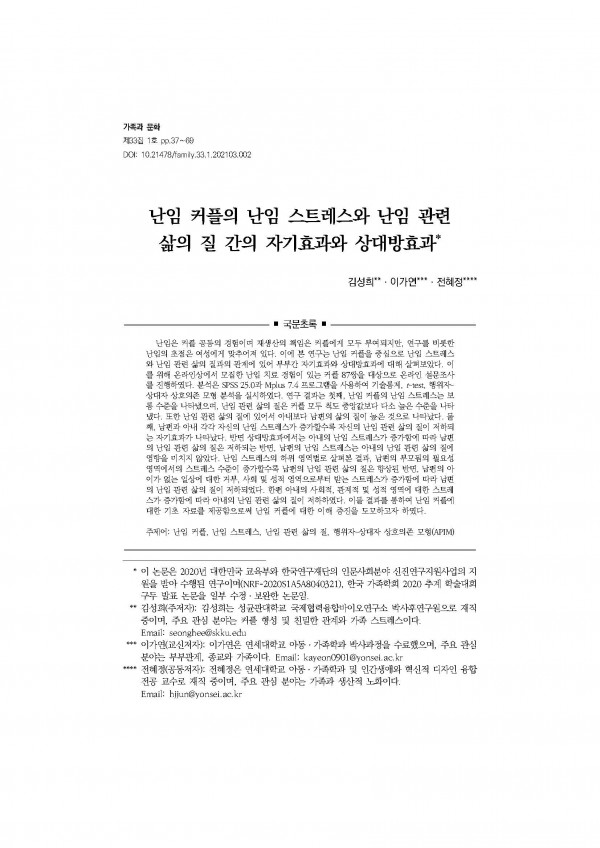논문 | 난임 부부의 난임 스트레스와 난임 관련 삶의 질 간의 자기효과와 상대방효과
페이지 정보
작성자 관리자 작성일21-06-04 17:32 조회303회 댓글0건관련링크
본문
김성희, 이가연 , 전혜정 (2021). 난임 커플의 난임 스트레스와 난임 관련 삶의 질 간의 자기효과와 상대방효과. 가족과 문화, 33(1). 37-69
DOI: 10.21478/family.33.1.202103.002
ABSTRACT
난임은 커플 공동의 경험이며 재생산의 책임은 커플에게 모두 부여되지만, 연구를 비롯한난임의 초점은 여성에게 맞추어져 있다. 이에 본 연구는 난임 커플을 중심으로 난임 스트레스와 난임 관련 삶의 질과의 관계에 있어 부부간 자기효과와 상대방효과에 대해 살펴보았다. 이를 위해 온라인상에서 모집한 난임 치료 경험이 있는 커플 87쌍을 대상으로 온라인 설문조사를 진행하였다. 분석은 SPSS 25.0과 Mplus 7.4 프로그램을 사용하여 기술통계, t-test, 행위자- 상대자 상호의존 모형 분석을 실시하였다. 연구 결과는 첫째, 난임 커플의 난임 스트레스는 보통 수준을 나타냈으며, 난임 관련 삶의 질은 커플 모두 척도 중앙값보다 다소 높은 수준을 나타냈다. 또한 난임 관련 삶의 질에 있어서 아내보다 남편의 삶의 질이 높은 것으로 나타났다. 둘째, 남편과 아내 각각 자신의 난임 스트레스가 증가할수록 자신의 난임 관련 삶의 질이 저하되는 자기효과가 나타났다. 반면 상대방효과에서는 아내의 난임 스트레스가 증가함에 따라 남편의 난임 관련 삶의 질은 저하되는 반면, 남편의 난임 스트레스는 아내의 난임 관련 삶의 질에영향을 미치지 않았다. 난임 스트레스의 하위 영역별로 살펴본 결과, 남편의 부모됨의 필요성영역에서의 스트레스 수준이 증가할수록 남편의 난임 관련 삶의 질은 향상된 반면, 남편의 아이가 없는 일상에 대한 거부, 사회 및 성적 영역으로부터 받는 스트레스가 증가함에 따라 남편의 난임 관련 삶의 질이 저하되었다. 한편 아내의 사회적, 관계적 및 성적 영역에 대한 스트레스가 증가함에 따라 아내의 난임 관련 삶의 질이 저하하였다. 이들 결과를 통하여 난임 커플에대한 기초 자료를 제공함으로써 난임 커플에 대한 이해 증진을 도모하고자 하였다.
A number of infertility-related research have mainly focused on rather women than men, even though infertility is a joint experience of couples and the responsibility of reproduction should be borne to the couples. Therefore, this research investigates the dyadic associations between infertility-related stress and quality of life in infertile couples. In order to achieve the aim of the study, an online survey was conducted targeting 87 married infertile couples. The SPSS 25.0 program and the Mplus 7.4 program were used for descriptive statistics, t-test, and APIM analysis. The results of this study are as follows: First, the level of infertility-related stress was similar to the median value, and the infertile couples showed higher levels of infertility-related quality of life than the median scale. Infertile men indicated higher levels of infertility-related quality of life compared to their partners. Second, regarding actor effects, infertile-related stress was negatively associated with infertility-related quality of life in both men and women. The partner effect of infertile-related stress on the infertile-related quality of life was significant among only women. The investigation on sub-scales of infertility-related stress showed that men’s infertility-related quality of life improved as their level of infertility-related stress in the domain of need for parenthood rose. On the contrary, men’s infertility-related quality of life dropped as their level of infertility-related stress in the rejection of child-free lifestyle, social, and sexual domain rose. Meanwhile, women’s infertility-related quality of life decreased as their stress in the social, relationship, and sexual domain increased. Finally, this research attempted to promote understanding the experience of infertile couples by providing basic information on them.
